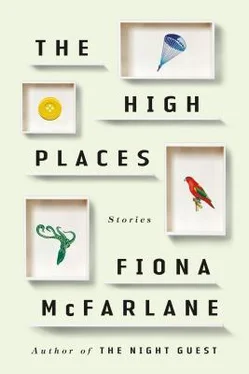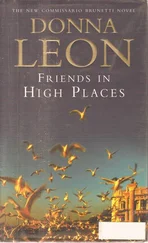The American floated above the pond, his feet partially submerged, greenish with weed and his parachute. I don’t know how he got there, or how they had missed him. The trees had caught him and hung him by his strings on the edge of the bush and the war. He had a scratched face and only one arm, whiskey breath, and the fish that swam at his booted feet were silver as tinfoil. Seeing his face was the very worst of our luck, Nora’s and mine. But as I tell our husbands, it didn’t last. We grew up, didn’t we. We left Merrigool, Nora first, me later, and found our husbands. We instructed our half-siblings on methods of escape and eventually they did, to lives that rarely involved us. We made telephone calls to our mother, and when Frank answered he never spoke to us for long.
Our mother died, and then Frank, and we returned to the house to clear it out. We walked to the pond, dry in the drought and empty of ducks. Once again, we heard Edith praying with her face to the late sky. We heard Frank calling our names, his voice soft as leather, only this time we didn’t go to him. And the American still floated above the water, turning in the wind, and the wind smelled of dinner.
Susan telephoned Rose at work to say she’d decided, finally, to accept her in-laws’ offer to visit California, and would be in Sydney for three days before the ship sailed — it sailed on the Monday, but there was shopping to do, the children had never been to the city, and there was no need for Rose to put them up, oh, but if she could, if it was no trouble, well, that would be lovely, and no, of course, a little flat would be more than big enough for the three of them, they would take up no space, almost none at all. Rose agreed to everything. The thought of her sister being in Sydney filled her with curiosity. Here was an opportunity to be kind to Susan, who was after all a widow. Rose said she would meet them off the train at Central, but Susan wanted to double-check her address and, as usual, laughed when she heard it.
‘Isn’t that just like you,’ she said. ‘To live in a place called Rose Bay.’
Rose laughed too. She made an effort, always, to be pleasant. Her boss referred to her as ‘particularly pleasant’; she had heard him. Her instinct to please people, without being over-eager, came from a dislike of disagreement. She knew Susan considered it immodest of her to live in a place that shared her name; it was the sort of thing Rose did in order to draw attention to herself.
‘It’s lovely there by the water, that’s all,’ Rose said, as she had before. ‘The name is just a coincidence.’
The name was not entirely a coincidence. Robert, the man who paid the rent on her flat, liked the idea of her living there. But walking home from the tram that night, Rose suspected her bay. It was too lovely. It was fragrant streets and bright water, schoolgirls in grey uniforms, nodding nuns, a golf course above the harbour. Flying boats landing on the bay and rising again, heading out for Lord Howe and Singapore. From her flat Rose looked over low rooftops and lower gardens onto the water, and the world was lamplit, lavender, particularly pleasant, and she belonged here, and was neither sad nor lonely. But her sister coming made her wonder, and she saw the lights on the other side of the harbour and understood that she was not entirely content, and not always quiet. Still, not sad. Not lonely.
A few days before Susan’s arrival, Rose went to the theatre with Robert to see an American dance company on tour in Australia. This company was very fashionable, according to the girls in the office, and very modern, full of Americans with illustrious pedigrees and Jewish refugees who’d danced their way out of the war. Tickets had sold out almost immediately; the girls wanted to know how Rose had come by one, but she couldn’t tell them because Robert was a partner in the firm, and married. Rose had her hair set and wore a new grey dress. She was interested in the Americanness of the dancers because Susan’s husband, Jonathan, had been American. Rose used to enjoy listening to his unanticipated voice, never knowing where it would rise or fall, but the rest of her family — even Susan — imitated him in his absence. Rose assumed they’d stopped after he died. She hadn’t been to see them in over a year, not since the funeral. They lived hours inland, in the kind of town this dance company would never visit.
The star of the troupe was a dancer called Adelaide Turner: diminutive, sprightly, with long expressive arms and a broad doll-face. She was famous even in Sydney, so many thousands of miles from the city she was born in, the name of which — Chicago — might as well have been the name of a fruit Rose had never tried, or an animal she’d never seen. Adelaide would dance that week in Sydney, the end of the company’s Australian tour, then sail home on the Coral Sea . The same ship was to carry Susan and the children to California to meet the other half of their family, which seemed to be full of healthy, sunlit cousins, expectant grandparents, and many uncles and aunts. It may have been for this reason — the shared ship — that Rose felt connected to Adelaide Turner; her face, too, reminded Rose a little of Susan’s. Jonathan had laughed at Rose once for seeing in famous people she admired a resemblance to someone she knew. But when Adelaide first came onstage, dressed as a girlish clown in a black smock covered with stars and red circles on her cheeks, Rose felt a funny tug at her own limbs. As Adelaide moved, left and right, above the lights and below them, her arms flying, her feet, Rose moved imperceptibly along with her — left, right, above, below. Her arms, her feet.
Afterward, walking through the night-time city, Rose noticed how many gulls hung in the light above office buildings and street lamps. Bats crossed overhead, quieter. Robert talked about the music and staging, but Adelaide Turner had made an impression on Rose that was too tender for discussion. She was filled with a longing she knew would occupy her for days, then disappear suddenly, as if cured. Rose was conscious of her body in the warm air. She enjoyed the movement of her arms by her side, and the muscles of her legs felt new and within her power. She listened to Robert and thought, I’m much younger than you are. Later that night, lying beside him, she felt her body lift from the bed and hang, for just a moment, in the half-lit room. Not long after, Robert got out of bed to wash and dress and leave for home; Rose lay still and pretended to be sleeping. The next morning, in her empty flat, she cut Adelaide’s picture from the programme and propped it on the mantelpiece.
* * *
Rose met Susan and the children off the train on Thursday evening and was relieved to be happy to see them. Lizzie and Alex were mute with the movement, the lights, and the station’s domed ceilings. They were nervous of their aunt and stumbled among the cases and bags. There was a great deal of luggage. It accumulated around their feet as they embraced and enquired and smiled. Then the effort of gathering it and directing Susan and the children and stepping into Rose’s city, into Rose’s life, as if this were natural and easy.
It was dark by the time they reached Rose Bay. Susan was a tourist peering into the small, lit rooms of Rose’s flat.
‘Well, this is very comfortable,’ she said. ‘What do you think, little ones? Isn’t Aunt Rose’s house nice? Isn’t it, Lizzie?’
The children’s tired, formal faces looked up at Rose.
‘It’s smaller than our house,’ said Lizzie. ‘It’s prettier, but we don’t have to climb steps.’
Susan made the children eggs and toast for supper while Rose moved bags into bedrooms under the surveillance of her niece and nephew. They were more distinct here than they had been at the funeral. Lizzie, the elder, seemed clear-headed and observant. Alex was more uncertain. His upper lip was puffy and folded to a sweet point in the middle, which gave him the look of a stiff cupid. Rose thought they were delightful and perhaps a little dull. She searched for their father’s likeness in their faces and failed to find it. Perhaps later, as they grew, they’d acquire Jonathan’s looks, the furrow between thick eyebrows she’d mistaken for good judgement. Upon being shown where he would be sleeping, Alex became raucous and insisted on displaying his navel to Rose.
Читать дальше












